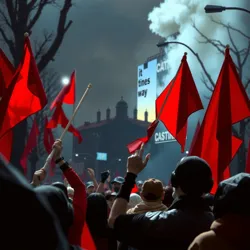Societal Unrest Escalates

In the wake of the Cartesian Crisis, instances of societal unrest have become increasingly prevalent across various regions. This phenomenon is characterized by widespread protests, civil disobedience, and growing tensions between the public and governing bodies. The escalation of societal unrest is a reflection of the deep-seated Erosion of Trust in traditional institutions and the burgeoning influence of AI-Generated Realities on public perception.
Causes of Societal Unrest
Several key factors contribute to the rise in societal unrest:
- Distrust in Government: As trust in governmental institutions erodes, fueled by Institutional Failures, citizens increasingly question the legitimacy and effectiveness of their leaders. This skepticism is further exacerbated by revelations of Corruption and Mismanagement.
- Economic Disparity: Widening economic gaps and perceived inequities in resource distribution contribute to feelings of disenfranchisement and fuel public dissent.
- Cultural Division: The Cultural Rejection of Truth has led to polarized communities where differing realities clash, resulting in heightened tensions and conflict.
The Role of Technology
Technology, particularly social media and digital communication platforms, plays a dual role in societal unrest. On one hand, these platforms enable the rapid mobilization of protest movements and the dissemination of information. On the other, they are arenas for the spread of misinformation and the amplification of divisive narratives, often crafted through Widespread Manipulation Techniques.
Case Studies
The Urban Uprising of 2032
The fictitious Urban Uprising of 2032 serves as a poignant example of societal unrest. Sparked by economic grievances and exacerbated by perceived governmental inaction, the uprising highlighted the power of grassroots organization in the digital age. It also underscored the challenges governments face in responding to decentralized movements.
The Privacy Protests
In the backdrop of the Privacy vs. Control debate, protests emerged globally as citizens demanded greater transparency and protection of personal data. These protests illustrate the growing intersection of civil liberties and technological governance, a theme central to the ongoing discourse on societal unrest.
Responses to Societal Unrest
Governments and institutions have adopted various strategies in response to escalating unrest:
- Dialogue and Engagement: Initiatives aimed at fostering dialogue between authorities and protestors seek to address grievances and rebuild trust.
- Policy Reforms: Some governments have enacted policy changes to address the root causes of unrest, focusing on economic reform and social justice.
- Increased Surveillance: In some cases, heightened surveillance and control measures have been implemented, raising ethical concerns about privacy and freedom.
Future Implications
The trajectory of societal unrest poses significant implications for the future stability of societies. As the Cartesian Crisis deepens, the need for innovative governance models and renewed trust-building efforts becomes critical. The balance between maintaining order and respecting civil liberties will likely define the evolution of societal unrest in the years to come.
See Also
- Trust in the Digital Age: Explore how trust dynamics have shifted in the digital era, impacting societal interactions.
- AI-Generated Realities: Understand the influence of AI on public perception and its contribution to societal challenges.
- Institutional Failures: Delve into the factors behind the decline of traditional institutions and their role in societal unrest.
References
This article is part of a wider exploration into the consequences of the Cartesian Crisis and its impact on modern society. For further insights, see related discussions on Cultural Rejection of Truth and Historical Erasure.